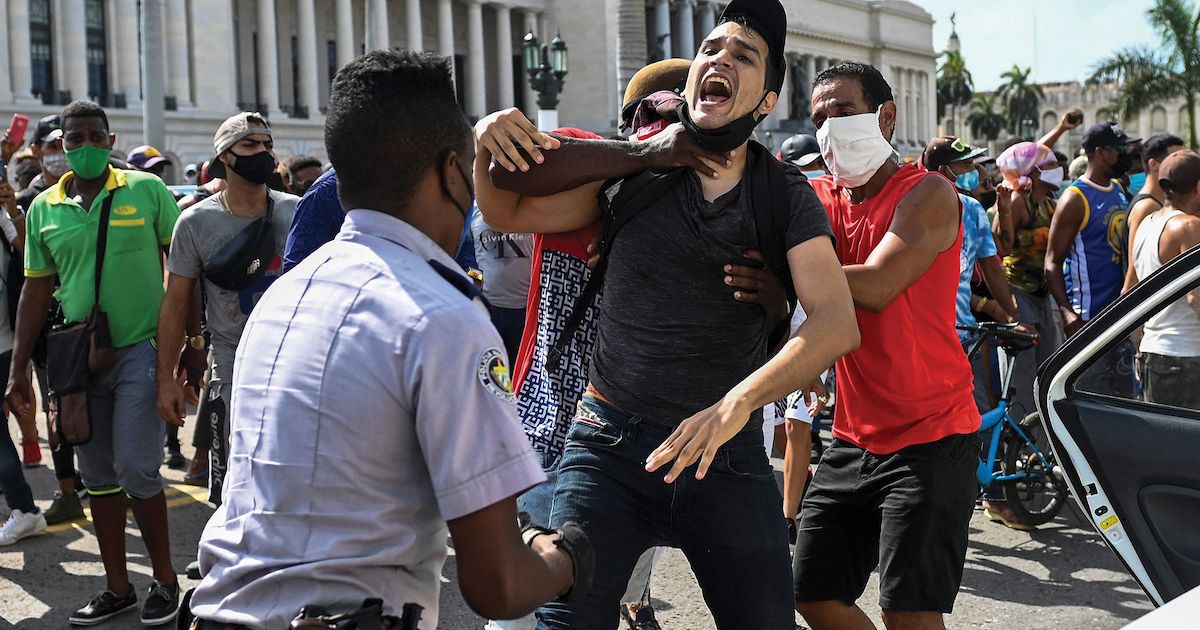
Last month, Amnesty International named the Cuban artists Hamlet Lavastida, Luis Manuel Otero Alcántara and four others as prisoners of conscience: “People imprisoned because of their political, religious or other beliefs who have not used or advocated violence.” Both artists, who are outspoken critics of government repression, have been held in maximum security prisons on trumped-up charges for several months. The statement from Amnesty is “a symbolic gesture to the many hundreds more who likely deserve the designation”, says the organisation’s Americas director, Erika Guevara Rosas, calling for the “immediate and unconditional release” of all those imprisoned.
But the Cuban regime shows no signs of loosening its grip on dissenters. Also in August, the government passed a new decree limiting the use of social media and the internet. These new laws make it a crime to incite acts “that alter public order”—such as organising or even showing support for a peaceful protest—and order internet providers to cut access to any users who “spread fake news or hurt the image of the state”. They also set fines ranging from $800 to $1,600 for providing telecommunications services without official authorisation.
Government crackdown
The crackdown started in July, when thousands of Cubans on the island took to the streets in one of the largest mass protests the country has seen since Castro’s 1959 revolution. Starting in the city of San Antonio de los Baños on 11 July, marches burst across the island like fireworks exploding, a great crash and flicker where only moments earlier the streets had been silent. People marched against hyperinflation, growing inequality, a lack of food, medicine and a government that seems unable or unwilling to get a handle on the coronavirus pandemic. The protests built on rallying calls for a freer, more liberal Cuba, led by artists including Lavastida and Otero Alcántara, who had been arrested dozens of times over the past few years for anti-government, pro-free speech performances.
The government responded with a protest of their own. President Miguel Díaz-Canel called on “revolutionaries” to flood the streets in support of the government, and state security forces arrested dozens of anti-government protesters.
Otero Alcántara and many others were taken into custody during the mass protests. Lavastida was incarcerated by state security forces on 26 June, when he returned to Cuba from a residency in Berlin, and he remains in prison for what is essentially a thought crime. The government got their hands on encrypted messages sent to fellow activists, in which Lavastida suggested marking Cuban currency with acronyms for the two most prominent artist-led freedom movements, 27N and MSI (San Isidro Movement), but the group never went through with his idea.
“The Cuban Communist party has established a vertical rule for the whole society that obliterates other forms of political representation and participation. It doesn’t matter if it’s Fidel Castro, Raul [Castro] or Diaz-Canal—as long as the Communist party is in power, Cuba will be a ‘dictatorship’ and nothing is going to change,” Lavastida told The Art Newspaper in April.
Artists’ revolt
Lavastida’s comments have so far proved to be true. Over the past year, the Cuban government has clamped down on artists, writers and activists who only seek the freedom to express themselves. They have been targeted, forced to stay in their homes, or thrown in jail and held for protesting, speaking out against the government and, in some cases, for even thinking about what change on the island could look like.
There is a glimmer of hope, however, that the Cuban government’s attempt to control the narrative may be coming to an end. Almost immediately after it was announced last month that the 14th Havana Biennial would be going ahead this November—under the perhaps ironic title, Future and Contemporaneity—cultural leaders and artists called for a boycott of the event. “Cuban artists who respect themselves as human beings should at least choose not to participate,” Sandra Ceballos, the founder and director of Aglutinador Art Space, wrote in a Facebook post. “At this moment, a substantial number of women and men, adolescents, young and old, [are] unjustly imprisoned, savagely beaten, humiliated and incommunicado… Among them are fellow artists, photographers and writers demanding freedom, respect for human and civil rights, and a dignified life for all Cubans. If all artists unite, we will not allow any more violations or blackmail.”
And if the July protests are any hint of what may lie in store for the island, a dialogue between the Communist party government and the people they claim to stand for may happen sooner than anyone is ready for.
Source link : https://www.theartnewspaper.com/news/cuba-on-the-brink-artistic-voices-refuse-to-be-silenced












